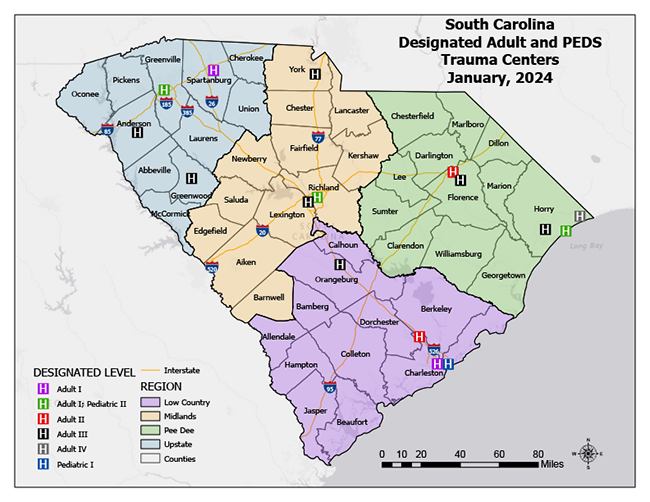What is a Trauma System?
The Trauma System is a network of definitive care facilities that provide a spectrum of care for all injured patients. An ideal trauma system includes all components identified with optimal trauma care, such as prevention, access, EMS, acute hospital care, rehabilitation, and research activities. In addition, trauma systems emphasize the need for various levels of centers to cooperate in the care of injured patients to avoid wasting precious resources.
- Trauma Regulation 61-116- (pdf)
- CDC Trauma Triage Guidelines- (pdf)
- Pediatric Multiple Trauma Protocols- (pdf)
- Pediatric Multi Trauma Protocols- (pdf)
- Pediatric Trauma Triage and Transport Protocols- (pdf)
- National Guideline for the Field Triage of Injured Patients- (pdf)
The care of injured patients requires a systematic approach to ensure optimal care. A systematic approach is necessary within a facility, however, no one trauma center can do everything. Thus, a system approach is necessary within a community regardless of its size.
The Difference Between a Trauma Center and an Emergency Department
Trauma is a surgical emergency. Verification and designation requirements set strict requirements for staffing, availability, response times, training, performance improvement, and injury prevention activities. Trauma centers have organized trauma teams that respond promptly. The Trauma Medical Director (a surgeon responsible for the trauma operations and care), and Trauma program Director are responsible to ensuring compliance with the requirements, and for carrying out all activities associated with the trauma program.
Emergency departments in hospitals that are not designated trauma centers may be staffed by an emergency physician, but do not have organized teams lead by a surgeon to respond to any traumatic injury. These facilities focus on evaluation, stabilization, and transfer to the appropriate facility as necessary.
South Carolina Trauma Centers
The following is a list of trauma centers in South Carolina based on level of designation. A description of the trauma centers can be found by visiting: https://www.facs.org/quality programs/trauma
Adult Level I Trauma Centers
- Grand Strand Medical Center- (PeeDee Region)
- Prisma Health Greenville Memorial Hospital- (Upstate Region)
- (MUSC) Medical University of South Carolina- (Low Country Region)
- Prisma Health Richland- (Midlands Region)
- Spartanburg Medical Center- (Upstate Region)
Adult Level II Centers
- Trident Medical Center- (Low Country Region)
- McLeod Regional Medical Center (PeeDee Region)
Adult Level III Centers
- AnMED Health Medical Center- (Upstate Region)
- Conway Medical Center (PeeDee Region)
- Lexington Medical Center (Midlands Region)
- MUSC Florence Medical Center- (PeeDee Region)
- Regional Medical Center-Orangeburg (Low Country Region)
- Piedmont Medical Center-(Midlands Region)
- Self Regional Medical Center- (Midlands Region)
Adult Level IV Trauma Centers
- McCleod Health- Seacoast- (PeeDee)
Pediatric Level I Trauma Center
- (MUSC) Medical University of South Carolina- (Low Country Region)
Pediatric Level II Trauma Centers
- Prisma Health Richland- (Midlands Region)
- Prisma Health Greenville Memorial Hospital- (Upstate Region)
- Grand Strand Medical Center- (Pee Dee Region)
For more information regarding the South Carolina Trauma System, please contact the DHEC Trauma Division at 803-545-4866.
